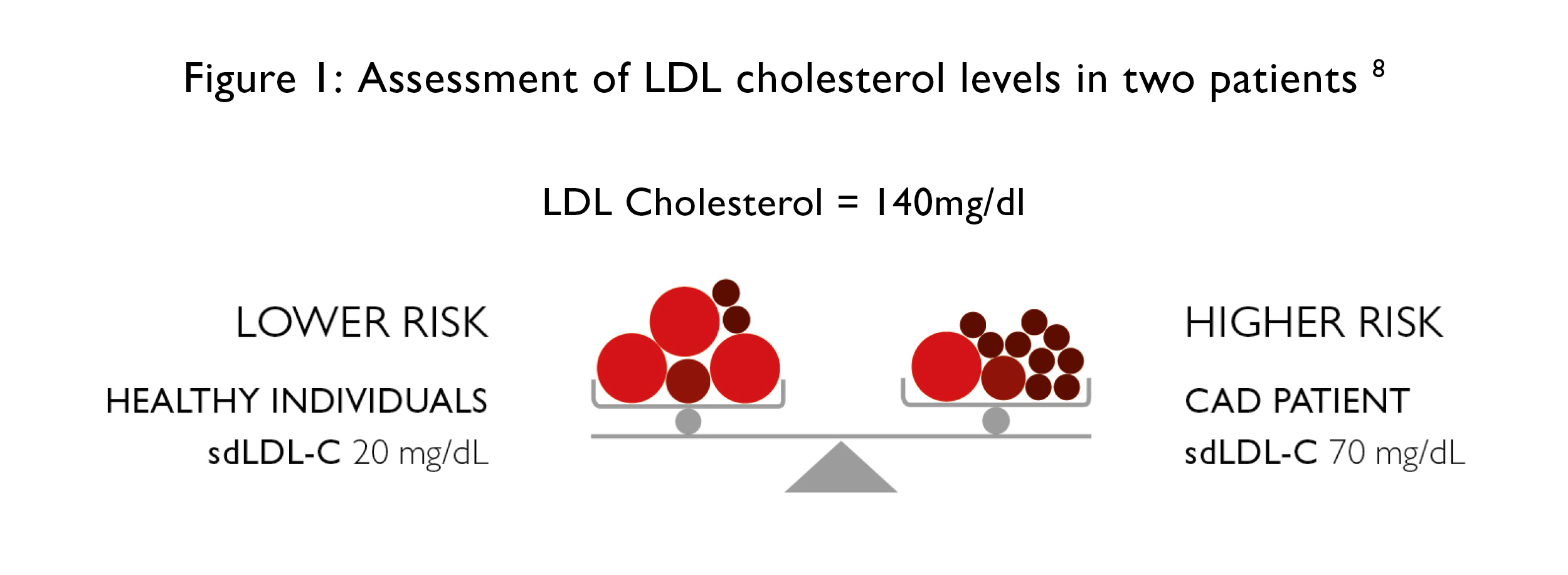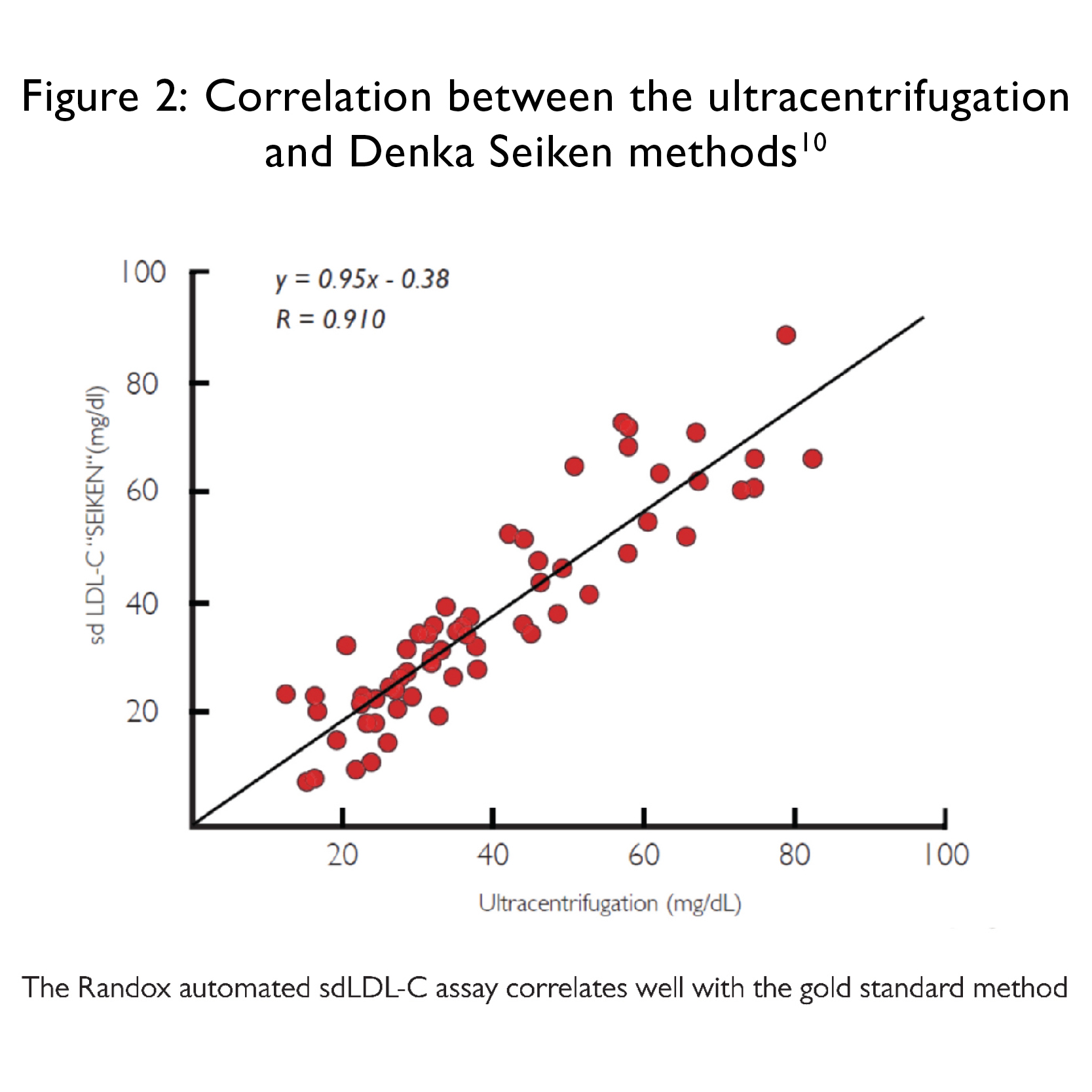Randox Unveils an Assay for the Rapid Measurement of Small Dense LDL Cholesterol (sdLDL-C)
|
By LabMedica International staff writers Posted on 13 May 2019 |

Assessment of LDL cholesterol levels in two patients (Photo courtesy of Randox).

Correlation between the ultracentrifugation and Denka Seiken methods (Photo courtesy of Randox).
A kit for the automated measurement of small dense low-density lipoprotein cholesterol (sdLDL-C) is now available with dedicated controls and calibrators available and instrument-specific applications for use with a wide range of biochemistry analyzers.
The lipid panel often used to assess cardiovascular disease risk comprises LDL cholesterol, HDL cholesterol, total cholesterol, and triglycerides. Results of these assays only detect about 20% of all atherosclerotic cardiovascular disease patients. However, studies have shown that sdLDL-C could predict risk of coronary heart disease in individuals considered being at low cardiovascular risk based on their LDL-C levels. These studies found that patients with a predominance of sdLDL-C had a three-fold increased risk of myocardial infarction (MI), while the relative risk was 4.5 for coronary artery disease and 7.0 for MI when sdLDL-C levels were greater than 100 milligrams per deciliter.
Until recently, the primary methods for determining a patient's sdLDL-C levels were based on laborious and time-consuming ultracentrifugation and electrophoresis. Then, in November 2017, the [U.S.] Food and Drug Administration granted 510(k) marketing clearance to Denka Seiken (Tokyo, Japan) for a small dense low-density lipoprotein cholesterol (sdLDL-C) assay designed for use on any standard clinical chemistry analyzer. The assay quantified sdLDL-C in serum and plasma samples in 10 minutes using a two-step process. The first step removed chylomicrons, very low LDL, intermediate-density lipoprotein, large LDL, and high-density lipoprotein using a surfactant and sphingomyelinase. In the second step, a specific surfactant released cholesterol only from the sdLDL-C particles for measurement by standard methods.
The Randox (Crumlin, United Kingdom) sdLDL-C assay utilizes the Denka Seiken method, providing accurate patient results. It was designed for use on automated biochemistry analyzers for efficiency and convenience. Applications are available detailing instrument-specific settings for the convenient use of the Randox sdLDL-C assay on a wide range of biochemistry analyzers. Dedicated sdLDL-C controls and calibrator are available providing a complete testing package. The Randox sdLDL-C assay is a niche product, and Randox is one of the only manufacturers of this test in an automated format.
The lipid panel often used to assess cardiovascular disease risk comprises LDL cholesterol, HDL cholesterol, total cholesterol, and triglycerides. Results of these assays only detect about 20% of all atherosclerotic cardiovascular disease patients. However, studies have shown that sdLDL-C could predict risk of coronary heart disease in individuals considered being at low cardiovascular risk based on their LDL-C levels. These studies found that patients with a predominance of sdLDL-C had a three-fold increased risk of myocardial infarction (MI), while the relative risk was 4.5 for coronary artery disease and 7.0 for MI when sdLDL-C levels were greater than 100 milligrams per deciliter.
Until recently, the primary methods for determining a patient's sdLDL-C levels were based on laborious and time-consuming ultracentrifugation and electrophoresis. Then, in November 2017, the [U.S.] Food and Drug Administration granted 510(k) marketing clearance to Denka Seiken (Tokyo, Japan) for a small dense low-density lipoprotein cholesterol (sdLDL-C) assay designed for use on any standard clinical chemistry analyzer. The assay quantified sdLDL-C in serum and plasma samples in 10 minutes using a two-step process. The first step removed chylomicrons, very low LDL, intermediate-density lipoprotein, large LDL, and high-density lipoprotein using a surfactant and sphingomyelinase. In the second step, a specific surfactant released cholesterol only from the sdLDL-C particles for measurement by standard methods.
The Randox (Crumlin, United Kingdom) sdLDL-C assay utilizes the Denka Seiken method, providing accurate patient results. It was designed for use on automated biochemistry analyzers for efficiency and convenience. Applications are available detailing instrument-specific settings for the convenient use of the Randox sdLDL-C assay on a wide range of biochemistry analyzers. Dedicated sdLDL-C controls and calibrator are available providing a complete testing package. The Randox sdLDL-C assay is a niche product, and Randox is one of the only manufacturers of this test in an automated format.
Latest Technology News
- Robotic Technology Unveiled for Automated Diagnostic Blood Draws
- ADLM Launches First-of-Its-Kind Data Science Program for Laboratory Medicine Professionals
- Aptamer Biosensor Technology to Transform Virus Detection
- AI Models Could Predict Pre-Eclampsia and Anemia Earlier Using Routine Blood Tests
- AI-Generated Sensors Open New Paths for Early Cancer Detection
- Pioneering Blood Test Detects Lung Cancer Using Infrared Imaging
- AI Predicts Colorectal Cancer Survival Using Clinical and Molecular Features
- Diagnostic Chip Monitors Chemotherapy Effectiveness for Brain Cancer
- Machine Learning Models Diagnose ALS Earlier Through Blood Biomarkers
- Artificial Intelligence Model Could Accelerate Rare Disease Diagnosis
Channels
Molecular Diagnostics
view channel
Diagnostic Device Predicts Treatment Response for Brain Tumors Via Blood Test
Glioblastoma is one of the deadliest forms of brain cancer, largely because doctors have no reliable way to determine whether treatments are working in real time. Assessing therapeutic response currently... Read more
Blood Test Detects Early-Stage Cancers by Measuring Epigenetic Instability
Early-stage cancers are notoriously difficult to detect because molecular changes are subtle and often missed by existing screening tools. Many liquid biopsies rely on measuring absolute DNA methylation... Read more
“Lab-On-A-Disc” Device Paves Way for More Automated Liquid Biopsies
Extracellular vesicles (EVs) are tiny particles released by cells into the bloodstream that carry molecular information about a cell’s condition, including whether it is cancerous. However, EVs are highly... Read more
Blood Test Identifies Inflammatory Breast Cancer Patients at Increased Risk of Brain Metastasis
Brain metastasis is a frequent and devastating complication in patients with inflammatory breast cancer, an aggressive subtype with limited treatment options. Despite its high incidence, the biological... Read moreHematology
view channel
New Guidelines Aim to Improve AL Amyloidosis Diagnosis
Light chain (AL) amyloidosis is a rare, life-threatening bone marrow disorder in which abnormal amyloid proteins accumulate in organs. Approximately 3,260 people in the United States are diagnosed... Read more
Fast and Easy Test Could Revolutionize Blood Transfusions
Blood transfusions are a cornerstone of modern medicine, yet red blood cells can deteriorate quietly while sitting in cold storage for weeks. Although blood units have a fixed expiration date, cells from... Read more
Automated Hemostasis System Helps Labs of All Sizes Optimize Workflow
High-volume hemostasis sections must sustain rapid turnaround while managing reruns and reflex testing. Manual tube handling and preanalytical checks can strain staff time and increase opportunities for error.... Read more
High-Sensitivity Blood Test Improves Assessment of Clotting Risk in Heart Disease Patients
Blood clotting is essential for preventing bleeding, but even small imbalances can lead to serious conditions such as thrombosis or dangerous hemorrhage. In cardiovascular disease, clinicians often struggle... Read moreImmunology
view channelBlood Test Identifies Lung Cancer Patients Who Can Benefit from Immunotherapy Drug
Small cell lung cancer (SCLC) is an aggressive disease with limited treatment options, and even newly approved immunotherapies do not benefit all patients. While immunotherapy can extend survival for some,... Read more
Whole-Genome Sequencing Approach Identifies Cancer Patients Benefitting From PARP-Inhibitor Treatment
Targeted cancer therapies such as PARP inhibitors can be highly effective, but only for patients whose tumors carry specific DNA repair defects. Identifying these patients accurately remains challenging,... Read more
Ultrasensitive Liquid Biopsy Demonstrates Efficacy in Predicting Immunotherapy Response
Immunotherapy has transformed cancer treatment, but only a small proportion of patients experience lasting benefit, with response rates often remaining between 10% and 20%. Clinicians currently lack reliable... Read moreMicrobiology
view channel
Comprehensive Review Identifies Gut Microbiome Signatures Associated With Alzheimer’s Disease
Alzheimer’s disease affects approximately 6.7 million people in the United States and nearly 50 million worldwide, yet early cognitive decline remains difficult to characterize. Increasing evidence suggests... Read moreAI-Powered Platform Enables Rapid Detection of Drug-Resistant C. Auris Pathogens
Infections caused by the pathogenic yeast Candida auris pose a significant threat to hospitalized patients, particularly those with weakened immune systems or those who have invasive medical devices.... Read morePathology
view channel
Engineered Yeast Cells Enable Rapid Testing of Cancer Immunotherapy
Developing new cancer immunotherapies is a slow, costly, and high-risk process, particularly for CAR T cell treatments that must precisely recognize cancer-specific antigens. Small differences in tumor... Read more
First-Of-Its-Kind Test Identifies Autism Risk at Birth
Autism spectrum disorder is treatable, and extensive research shows that early intervention can significantly improve cognitive, social, and behavioral outcomes. Yet in the United States, the average age... Read moreTechnology
view channel
Robotic Technology Unveiled for Automated Diagnostic Blood Draws
Routine diagnostic blood collection is a high‑volume task that can strain staffing and introduce human‑dependent variability, with downstream implications for sample quality and patient experience.... Read more
ADLM Launches First-of-Its-Kind Data Science Program for Laboratory Medicine Professionals
Clinical laboratories generate billions of test results each year, creating a treasure trove of data with the potential to support more personalized testing, improve operational efficiency, and enhance patient care.... Read moreAptamer Biosensor Technology to Transform Virus Detection
Rapid and reliable virus detection is essential for controlling outbreaks, from seasonal influenza to global pandemics such as COVID-19. Conventional diagnostic methods, including cell culture, antigen... Read more
AI Models Could Predict Pre-Eclampsia and Anemia Earlier Using Routine Blood Tests
Pre-eclampsia and anemia are major contributors to maternal and child mortality worldwide, together accounting for more than half a million deaths each year and leaving millions with long-term health complications.... Read moreIndustry
view channelNew Collaboration Brings Automated Mass Spectrometry to Routine Laboratory Testing
Mass spectrometry is a powerful analytical technique that identifies and quantifies molecules based on their mass and electrical charge. Its high selectivity, sensitivity, and accuracy make it indispensable... Read more
AI-Powered Cervical Cancer Test Set for Major Rollout in Latin America
Noul Co., a Korean company specializing in AI-based blood and cancer diagnostics, announced it will supply its intelligence (AI)-based miLab CER cervical cancer diagnostic solution to Mexico under a multi‑year... Read more
Diasorin and Fisher Scientific Enter into US Distribution Agreement for Molecular POC Platform
Diasorin (Saluggia, Italy) has entered into an exclusive distribution agreement with Fisher Scientific, part of Thermo Fisher Scientific (Waltham, MA, USA), for the LIAISON NES molecular point-of-care... Read more















